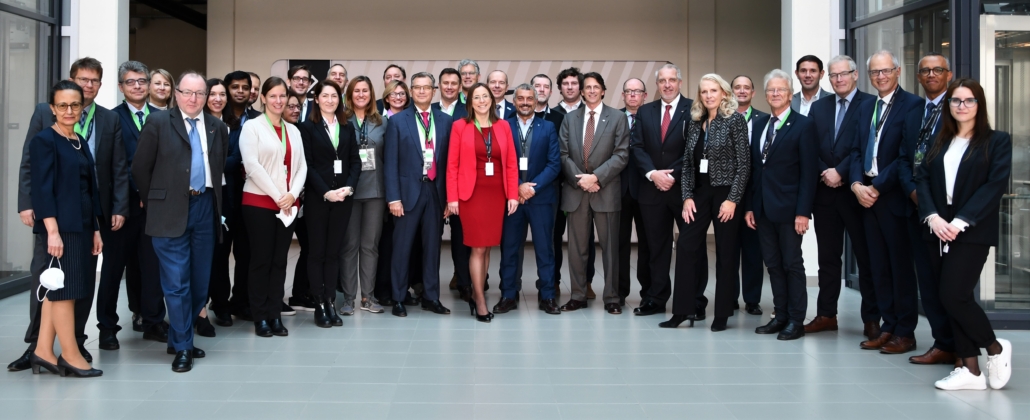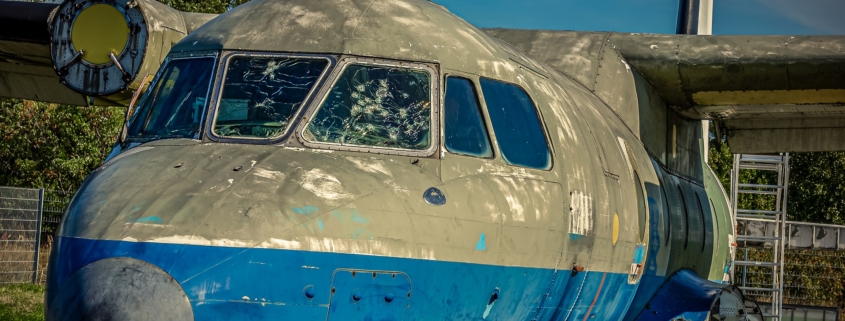This is the Week of the Circular Economy in the Netherlands. During last year’s edition, NLR organised a webinar and, together with its partners, NLR has been up to a lot since then. Connections were made with like-minded organisations and NLR incorporated the concept of circular aviation in its new Climate-Neutral Aviation programme. However, many more circular practices still need to be included.
The circular economy has taken a prominent position in Europe since the launch of the EU Green Deal. The European goal of becoming climate-neutral by 2050 has positioned the transition to a circular economy as a fundamental step towards achieving that goal. All European countries and industries have been busy since then getting acquainted with circular economy principles and approaches. In the Netherlands, the circular economy was already a hot topic in many industries and several cities already had stated their ambitions to become circular cities; however, not much was happening in the aviation sector, where the topic was limited to (and clearly misunderstood to mean) waste management and recycling only. In 2019, NLR took the role of becoming the Circular Economy ambassador for the Dutch aviation sector, supported in this at the European level by all other European research institutes within the EREA Future Sky Circular Aviation initiative.
Circular economy
From 7 to 12 February 2022 in the Netherlands, it is the annually recurring week van de circulaire economie (Dutch for ‘the Week of the Circular Economy’). Last year about 140 participants from NLR and across Europe joined an NLR webinar called ‘The future is circular; closing the loop in aviation’. This webinar was the first event in which NLR reached out publicly to its network in the Netherlands and Europe and presented a research strategy and projects related to the circular economy in aviation.
“It was the first time we really mentioned ‘Circular Aviation’, as defined by the EREA Future Sky group, out loud at NLR, and introduced it as a new notion to be embedded within the idiom of NLR and the aviation industry,” recalls Ligeia Paletti, Circular Economy expert at NLR. The trend towards the circular economy becoming important for European research centres has been visible to people involved directly with EU commission, but for the researchers it was something obscure and remote from their daily work. The concept became more familiar to them and creating such awareness is essential for NLR’s role in helping the aviation industry make the transition to sustainable aviation. Many researchers also realised that the topics they were already working on, such as additive manufacturing and MRO, fitted the narrative of the circular economy.
Creating a European circular aviation community
Numerous connections were made at that event and ideas for collaboration were conceived.
The Horizon 2020 SUSTAINair project, which kicked off in January 2021 and was presented during the event last year, has been progressing steadily. It also organised an event during the EU Green Week: ’Circular aviation for green growth’ was a virtual panel discussion and a showcase session, which brought together almost 200 experts, students, policymakers and researchers from the aviation ecosystem.
Recently, in January 2022, another project was kicked off by the EU that has strong links with the circular economy. NLR is also playing a part in this consortium TULIPS – Green Airports, led by Royal Schiphol Group. The project aims to speed up the rollout of sustainable technologies in aviation and significantly help achieve zero-emission and zero-waste airports by 2030 and climate-neutral aviation by 2050.
In addition to the EREA Future Sky group, a Dutch Circular Aviation group was created. The purpose of the group is to exchange information between academia, industry and research institutes about current research topics, challenges from the industry and possible collaboration opportunities.
The young generation
Dr David Peck, a member of the Delft Circularity Initiative at Delft University of Technology (TU Delft) and panellist in the NLR event of 2021, facilitated a dialogue between NLR and TU Delft on topics related to the circular economy and possible collaboration. From those conversations, NLR connected with the LDE Centre for Sustainability. Although many aviation practices are already circular, there is a clear need to collate what is already known about circularity and sustainability in other sectors and relate it to the specific character of aviation.
“Working with students connects with the part of society which has been most vocal in criticising the response of the aviation sector to the climate crisis,” Paletti explains. She also emphasises the point: “It empowers the young generation to solve the problems they are already fully aware will fall on them. Their energy and commitment are also inspirational for the current workforce in the aviation industry, an industry that tends to be conservative in some aspects.”
Eventually this led to the first initiative for submitting the topic of circular aviation to the Sustainability Challenge for the Industrial Ecology master’s degree, a collaboration between the universities of Leiden and Delft. A group of students picked up that challenge and developed a lifecycle assessment tool that could evaluate the environmental footprints of the choices passengers make during a flight. The tool would let passengers make more sustainable choices and airlines could use the data to provide more sustainable options, in line with what the passengers want.
Interdisciplinarity is unavoidable in addressing circular economy challenges in every sector
In parallel, NLR and the LDE Centre for Sustainability started creating an interdisciplinary graduation lab. Interdisciplinarity is unavoidable in addressing circular economy challenges in every sector. The academic coordinator will be Dr Irene Fernandez Villegas, Associate Professor at the TU Delft.
“Irene and I have similar backgrounds in aeronautical structures,” explains Paletti, “and we both have the same dream of leaving the world a better place than it is today. We both went through the same journey from hardcore engineers to embracing sustainability in our lifestyles. Working with her is very inspirational and keeps my energy levels up.” The Circular Aviation graduation lab will kick off on 9 February, coincidentally during the Week of the Circular Economy.
The industry
On the industrial side, several companies have approached NLR for assistance in understanding the circular economy and identifying business opportunities. Aeroplane Furniture, for instance, asked NLR to create a clearer picture of the market for reusing parts from non-airworthy aircraft.
The circular economy in the aviation sector was also a topic of discussion during the ‘Aerospace meets high tech’ event, organised by NAG, BOM, Brainport Industries and KMWE on 30 September.
“During that event, two aspects became evident,” says Paletti. “First of all, the Dutch aerospace and high-tech industry is not fully aware of the implications of what the forthcoming regulations linked to circularity and sustainability will mean for their businesses. Secondly, other industries already have circular solutions for the challenges of the aviation sector and vice versa.”
The food industry is already familiar with developing and implementing digital product passports, for instance, which has been a topic of research in aviation as well. It is however a long way from commercial implementation yet, mainly due to issues with data privacy and ownership that other industries have also already resolved.
NAG is following up, enabling the Dutch industry to face the upcoming challenges related to circularity and sustainability of with an upcoming event on 17 February. NLR wants to share its knowledge about the circular economy with not only the aviation industry but also the Dutch and European communities. It is therefore creating links to various Dutch regional initiatives and SMEs, and working on collaboration in the broader mobility sector – from automotive to railways – looking future mobility aspects such as Urban Air Mobility too.
What’s next
As of January 2022, NLR has entered a new strategy period that will run until 2025. In this new strategy, the circular economy will be one of the topics NLR will be researching. Herma LAAMA de Walle, NLR programme leader for the Climate-Neutral Aviation programme, believes that the circular economy is going to be an essential element for achieving NLR’s strategic goals. In that regard, she agrees entirely with Paletti. “There is no way aviation can be become sustainable without incorporating circular practices,” she says.
One example of an opportunity for NLR member companies, is to learn more via a new circular company-based training workshop called ‘Lean Remanufacturing’, supported by the EU EIT Manufacturing programme. TU Delft will work with NLR on developing this circular training opportunity for employees.
Paletti is also considering options for a follow-up to the previous NLR circular event.
“It would have been great to have another event more quickly, but we should take time to organise something that follows on from the success of last year’s event and the actions I’ve just described. We need time to absorb, reflect and plan. What’s important is that the aviation community is embracing the circular economy and sustainability as topics, more holistically and in their true meaning – beyond the focus on zero-emission propulsion solutions.”
This is reflected not only in the large number of projects that are currently being prepared by NLR and its partners, but also by the number of initiatives that NLR is being asked to contribute to: all focused on making aviation circular and sustainable.

Together with representatives of research institutes from throughout the world such as CEO Royal NLR Michel Peters (third from right), Ligeia Paletti (in the middle, dressed in red) attended the International Forum for Aviation Research (IFAR) in 2021.
- For more information, please visit our website: https://www.nlr.org/capabilities/circular-economy/



 Ger Nielen (NLR)
Ger Nielen (NLR)